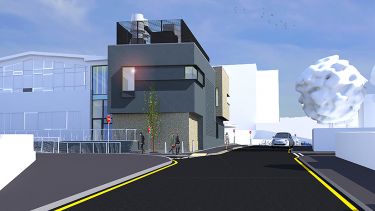The Sheffield PET-MRI facility
Building ground-breaking medical research facilities.

Overview
We’re bringing the future of medical imaging to Sheffield.
The University of Sheffield has raised £2 million to establish a ground-breaking PET-MRI facility.
MRI-PET scanners deliver the most advanced imaging technology to date. PET-MRI will transform our understanding of serious diseases and the way we treat them in the future. This is a vital investment in the health of people in this region, across the UK and beyond.
The scanner is in a purpose-built facility which we are building attached to the Royal Hallamshire Hospital (RHH), close to the inpatient entrance and the University’s Medical School, offering easy access for patients, clinicians and researchers.
We've built a two-storey building which will house the PET-MRI scanner, as well as associated laboratory facilities and staff.
The facility has two entrances: one on the ground floor beside the drop-off area and another on the second floor, connecting with the University and RHH radiology services. The second floor houses a comfortable waiting area, two pre-scan patient rooms, a suite of workstations for reviewing scan images and a fully radiation-shielded space for the PET-MRI scanner itself.
What is PET-MRI
PET-MRI is a new type of medical scanner which combines two powerful imaging technologies - PET and MRI - that are already used separately in medical research and in hospitals.
PET (Positron Emission Tomography) uses a radioactive tracer chemical to build up a picture of how well parts of the body are functioning. MRI (Magnetic Resonance Imaging) uses magnetic and radio waves to build up a picture of the internal structure of the body.
The PET-MRI scanner is able to capture both of these images at the same time, in a single scan, and gives a more detailed picture of what is happening within the body.
Project details
- Project manager: Gaynor Bradshaw-Willson, Department of Estates and Facilities Management
- Emal: g.bradshaw.willson@shef.ac.uk
- Telephone: +44 114 222 9118
- Architects: Castle Owen
- Timescale: Construction starts in early 2019 and lasts for approximately 18 months
Design
News
August 2020: Britcon have been appointed as the main contractor to undertake the fit out of the PET-MRI building. They will be working on preparing the workshop space, technical library, storeroom facility, as well as associated mechanical and electrical works.
The main site office and welfare facilities will be at the University's Polaris facility at 18 Claremont Crescent with a satellite office within the PET MRI building. Careful consideration has been given to minimising noise and disruption to surrounding neighbours and the general public.
- Past news
March 2020: We have received practical completion of the building. Engineers are now commissioning and testing the equipment, ready for the first patients.
December 2019: The scaffolding has now been removed and you can see the progress clearly.
17/4/19: Works are progressing well on site. The tower crane has now been installed on site and its first task was to lift in the three storey lift shaft.
The ground floor floor slab has been installed and works have commenced with ground to first floor columns ready for the first floor slab pour.
A open doors event took place in March which was well received by the members of the public who took up the opportunity to visit the site.20/2/2019: Continuing to progress on foundations of the building.
16/2/19 and 17/2/2019: Claremont Crescent closed to allow drainage connections.
Project benefits
Benefits for patients:
- Faster diagnosis
- Tracks progression of disease more accurately
- Enables real-time treatment monitoring
- Accelerates discovery of new drugs
- Single scan: fewer hospital visits
The PET-MRI facility will transform patient care in future by increasing our understanding of the causes, effects and development of many different diseases, including dementia, cancer, multiple sclerosis, Parkinson’s disease, motor neurone disease (MND), diabetes, epilepsy and stroke.
The knowledge we gain from the scanner will allow us to take exciting discoveries from the laboratory into the hospital.
As one of only eight of its kind in the UK, and the only one in Yorkshire, the PET-MRI scanner will give patients in the region access to new clinical trials. These trials are an important way of developing new therapies and better outcomes for patients. Our research may lead to easier and faster diagnosis, characterisation, staging and treatment of disease.
Contact us
For project enquires contact the project manager. For general enquiries, contact the EFM Help Desk.

